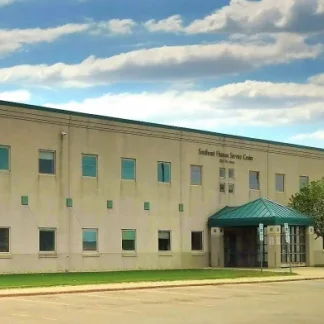Gull Harbour
Gull Harbour is an Intensive Residential Treatment Services (IRTS) program. It i...
The Southeast Human Service Center is a dual-diagnosis behavioral health rehab in Fargo, ND. Treatment at the Southeast Human Service Center is designed to support individuals facing challenges related to mental health and substance abuse.
With a commitment to fostering wellness and empowerment, they offer an array of services including:
The Southeast Human Service Center’s dedicated team works diligently with individuals to overcome addictions. By integrating evidence-based therapies and personalized care plans, the center facilitates a journey of recovery that acknowledges each individual’s unique experiences.
Recognizing the intricate nature of mental health, the center offers various services, from outpatient therapies to crisis intervention. They prioritize a holistic approach, ensuring clients not only manage symptoms but also move towards complete mental well-being.
Emergencies require immediate action, and the SoutheastHuman Service Center is always prepared. Their crisis intervention team is adept at handling urgent mental health or substance abuse situations, ensuring safety and stabilization.
Contact us for more information: (701) 298-4500

Connect with Southeast Human Service Center - Alcohol and Drug Abuse by calling their admissions team directly.
(701) 298-4500 Website Get DirectionsGroup therapy is any therapeutic work that happens in a group (not one-on-one). There are a number of different group therapy modalities, including support groups, experiential therapy, psycho-education, and more. Group therapy involves treatment as well as processing interaction between group members.
Trauma therapy addresses traumatic incidents from a client's past that are likely affecting their present-day experience. Trauma is often one of the primary triggers and potential causes of addiction, and can stem from child sexual abuse, domestic violence, having a parent with a mental illness, losing one or both parents at a young age, teenage or adult sexual assault, or any number of other factors. The purpose of trauma therapy is to allow a patient to process trauma and move through and past it, with the help of trained and compassionate mental health professionals.
Trauma therapy addresses traumatic incidents from a client's past that are likely affecting their present-day experience. Trauma is often one of the primary triggers and potential causes of addiction, and can stem from child sexual abuse, domestic violence, having a parent with a mental illness, losing one or both parents at a young age, teenage or adult sexual assault, or any number of other factors. The purpose of trauma therapy is to allow a patient to process trauma and move through and past it, with the help of trained and compassionate mental health professionals.
Gull Harbour is an Intensive Residential Treatment Services (IRTS) program. It i...
Lakeland Mental Health Center – Moorhead is a private rehab located in Moorhead,...
Mesabi Rehabilitation Services is a private rehab located in Fargo, North Dakota...
Off Main is a private rehab located in Fargo, North Dakota. Off Main specializes...